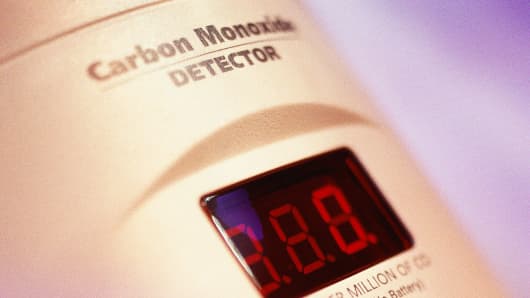Eight people have died and at least 170 others have been treated for carbon monoxide poisoning in the past three years in hotels, which rarely are equipped with CO alarms, a USA Today investigation finds.
And a review of state and local laws finds few states or municipalities require hotels to be equipped with the alarms — devices that the National Fire Protection Association says should be near bedrooms in every home.
Carbon monoxide in a hotel "can harm dozens at a time," and a hotel "has a duty to protect its guests," said Lindell Weaver, a University of Utah professor of medicine who's written studies on the subject and evaluated more than 1,000 patients with CO poisoning.
Often called "the silent killer," CO is a colorless, odorless and tasteless toxic gas produced by incomplete combustion in fuel-burning devices such as motor vehicles, furnaces, boilers and heaters for water and swimming pools.
There are no complete statistics on how many people are treated or die from CO poisoning annually — let alone in hotels.
A USA Today analysis of more than 1,000 news accounts of hotel incidents and interviews with local fire departments found 30 instances from 2010 through Nov. 8, of fire and other public-safety officials finding high levels of CO gas in hotels.
More than 1,300 people were evacuated in the incidents.
At the Embassy Suites near San Francisco airport in Burlingame, Calif., for instance, about 400 people were evacuated on Nov. 8 because of high CO levels. Central County Fire Department Chief Don Dornell said a boiler malfunctioned.
And in January, a guest was killed, 16 others were taken to a hospital and the Holiday Inn Express in South Charleston, W.Va., was evacuated after carbon monoxide leaked into the hotel from a swimming pool heater, South Charleston Fire Chief John Taylor says. Holiday Inn's parent company is InterContinental Hotels Group .
As of last year, there were 4.9 million guest rooms in 51,214 hotels, motels, bed and breakfasts with with 15 rooms or more in the U.S., according to the American Hotel & Lodging Association.
Weaver says each of those rooms should be equipped with alarms to alert guests and hotel managers if gas levels are dangerously high.
USA Today asked major hotel chains to identify hotels with alarms for every room. Most didn't respond, and none named a single hotel with such equipment.
Equipping each room with an alarm — which cost about $100 apiece and must be replaced about every five years — is too expensive compared with the risk, says Tom Daly, a consultant for the American Hotel & Lodging Association.
Installation could cost the industry $250 million, he says, while the chance of guests being poisoned is as rare as "being hit by a meteor."
Medical experts — including Weaver and Robert Rosenthal, a doctor and professor at the University of Maryland's School of Medicine — dispute the comparison.
"I've treated a number of people with CO poisoning in hotels, but I have yet to treat a patient with a meteor injury," Rosenthal says.


